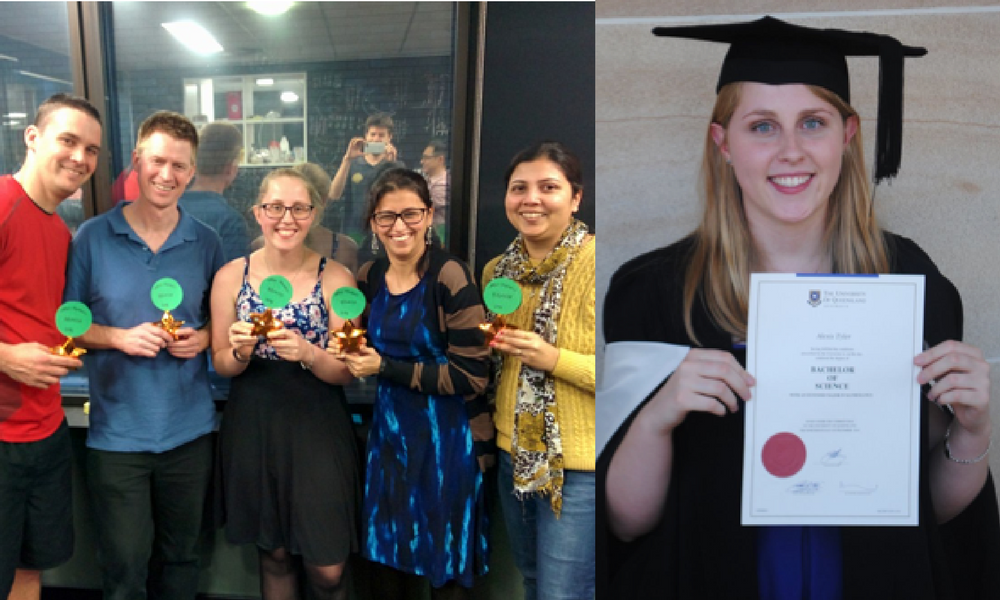FROM INTERN TO SCRUM MASTER - MEET OUR RISING STAR!
03/11/2017
Written by Frederic Kalinke
Meet Alexis Tyler, Software Engineer & Scrum Master for SilverRail Brisbane
In our latest blog we’d like to introduce you to one of SilverRail’s rising stars – Alexis Tyler. In just over a year, Alexis has gone from intern to software engineer and scrum master, despite coming from a non-technical background. To find out how she did it, we pulled her aside for an exclusive interview.
- Firstly, let’s get the background information. What university did you go to, and what subject did you study there?
I went to the University of Queensland where I studied a Bachelor of Science (Honours) degree majoring in Mathematics.
- How did you first hear about SilverRail?
I first heard about SilverRail at the end of my third year at University. I received an email from the maths department advertising an internship program which were running over the summer, in conjunction with various industry partners. SilverRail was one of the companies participating in the program.
- What made you apply for the role at SilverRail?
I wanted to go into industry, and so I thought doing an internship would be great experience for me. The way the program worked at that time you applied to all the companies participating, and so it was actually by chance that I ended up working at SilverRail.
However, once I had completed my internship with SilverRail, and having the most amazing experience throughout – with interesting projects to work on, a fun and friendly environment, and above all, awesome people – there was no doubt in mind that I wanted to come back, and so I applied for a full-time position.
- Had you ever coded before the role at SilverRail?
Whilst I was at University, I did some courses that involved programming. I had experience in Python, Matlab and R. I had also conducted a summer research project the previous year, which involved learning python from scratch and writing quite a lot of code, and so I was confident that I could learn a new language on the job. After I completed the internship, I was proficient in the main languages we use in the Brisbane office today, so I did not consider my lack of University software experience to be a barrier when I applied for the full-time position.
- When you applied for the role, did you think your mathematics experience would help with the role at SilverRail?
When I first applied for the internship, I wasn’t familiar with the work that SilverRail did, and even after studying the website, I couldn’t decipher what I would be doing on a day to day basis working there. However, since the role was advertised via the maths department I assumed that my maths skills would be beneficial. During my internship, there were certainly advantages to having a maths background, as my project consisted of researching various algorithms for road journey planning, selecting the most appropriate one for our purposes, and implementing the algorithm described in the paper (an exercise that I had done before in some applied math courses). In my current role, my math knowledge is less directly applicable. However, the skills I learnt at university are very useful. Also, my team works a fair bit on the algorithms behind our products, and so maths knowledge is used a lot there.
- What sort of training did you receive during your time at SilverRail? (e.g. on the job training / online courses)
When I first started my internship, I didn’t go through any formal training. However, I did spend a week using online tutorials to learn the programming language I would be using throughout, but from then on, I was just learning on the job. Since I have started full time, I have completed a few training courses, I have done an agile scrum training course and a small team leadership course which I have found to be very useful. Overall, much of my training has been on the job learning – working through any issues with the more experienced developers.
- Describe a typical ‘day in the life’ of a SilverRail Software Engineer?
The first thing I do when I get to work in the morning is check Slack (an internal instant messaging tool) and my email. Since we are a global company with customers and offices in different time zones, there are often emails I need to action from the night before. After that I work on sprint tasks until it is time for stand-up. We have a stand-up (15 min update meeting) every morning at 9:45am, this gives us the opportunity to talk about what we got done yesterday and plan what we are going to work on today. If we have support tasks that need to be responded to today, we have a “support swarm” after stand-up which is when the whole team goes into a meeting room and assesses and answers all the current support issues together. After that we go back to our desks and work on sprint tasks. This often involves a lot of pair programming or collaboration as we try and have multiple people working on every task where possible. If it is a Monday at lunch time we do yoga in the office. On Wednesdays, we play soccer in the botanical gardens over lunch. After lunch its back to sprint work or meetings if there are any that day. At some point throughout the day there is usually a game of ping pong.
- What’s your favourite part about the role/company?
My favourite thing about SilverRail is the work environment and the people! Everyone who I have worked with at SilverRail has been friendly, interesting and over the top helpful. I love the focus on enjoying life that SilverRail as a company has, we do a lot of social events, baking contests and table tennis competitions, which are always great fun for all involved. I feel lucky to be one of those people who can honestly say that they like their job!
- What has been your biggest achievement/proudest moment at SilverRail and why?
I would say that my biggest achievement working at SilverRail so far was when I had the opportunity to supervise a maths intern from UQ last summer. I loved working with Matilda, and it was a great learning experience for me, in which I developed my leadership skills, whilst learning about other areas in the business, compared to those that I typically work in. It felt like a real “full circle” moment, as I was able to mentor the next generation of interns, and show them how much fun a career in industry can be – just like my supervisors did for me.
- Tell us a bit more about being a scrum master – what it is, and how you were appointed the new role?
A scrum master is the servant leader for an agile development team. The scrum master owns the team’s process. They help the team perform at their highest level by removing impediments, facilitating meetings, working with the product owner, and coaching the team in the values and practices of scrum etc. After I had been in my full-time position at SilverRail for a few months we had a team restructure and I got put on a newly formed team that did not have a scrum master. At SilverRail the scrum master is a voluntary position that is decided by the team. My new team thought that I would be the best fit for the scrum master role so I decided to take on the challenge and agreed to do it!
- Now that you’ve worked for SilverRail for over two years, in your own words, how would you describe what it is we do to someone new? (maybe mention some customers too)
SilverRail’s mission is to power global rail and lifting the industry into a seamless customer experience. We offer several software products for use in the transport industry (journey planning, booking software etc.). In the Brisbane office, we work on the journey planning software for public transport. We have people from a variety of backgrounds working at SilverRail such as engineers, developers and mathematicians. Our customers are train operating companies, local transit authorities and travel agencies.
- How does SilverRail approach solving problems and what methods do they use?
SilverRail approaches solving problems in several interesting and novel ways. One of these ways is by letting scrum teams have “innovation sprints”, an innovation sprint is a sprint where the team chooses a problem to focus on and then is set loose to solve it. They can use whatever techniques or methods they like to solve the problem and are encouraged to be creative and not to worry about trying something crazy! These innovation sprints have been very successful for us in solving several the most challenging problems we have faced as a company. Another way we solve problems is by holding regular communities of practice (COPs) in different areas e.g. algorithms, agile, quality engineering etc. A COP is a group of people who share an interest in a topic and want to learn more about it by interacting with each other regularly. These COPs give us the opportunity to share knowledge, discuss problems and brain storm ideas as a group.
- What was the most surprising thing you found out about SilverRail once you joined the company?
The most surprising thing I found out about SilverRail, was how much fun it is to work here. I was very nervous before my first day of work, I didn’t know what my project would be, what the people would be like, or how I would use my skills to solve the problems put in front of me. However, I quickly discovered that everyone was extremely friendly and helpful, they tailored the project to my skill set which enabled everyone to get the most out of it as possible. The winning combination of great people and interesting work is what makes SilverRail a great place to work, a fact I was pleasantly surprised to learn shortly after joining the company.
- And finally, two more personal questions about you. What do you like to do in your spare time, or as SilverRail would say – how do you enjoy life?
I enjoy Latin dancing, reading, singing in my community choir and learning new things (I am currently taking a course in Australian Sign Language – AUSLAN).
- And but not least, tell us an interesting fact about yourself?
I have lived in five countries (Australia, England, Romania, Russia and Peru) on three continents and can speak Spanish and English fluently. Also, I have a street named after me, by my grandfather, called Alexis Court in Gladstone, QLD.
JOIN US AND CHANGE THE FUTURE OF RAIL TRAVEL
- Do you want to work on a product that is really changing the world for the better?
- Are you passionate about programming, software development and cloud computing?
- Do you like working on difficult problems that have not yet been solved?
- Are you an innovator with great ideas you’re prepared to defend?
- Can you work independently, yet still contribute to your team?
…If this is you, come join our team and help change the future of rail. We believe anything is possible if we put our minds to it – check out our career page.




